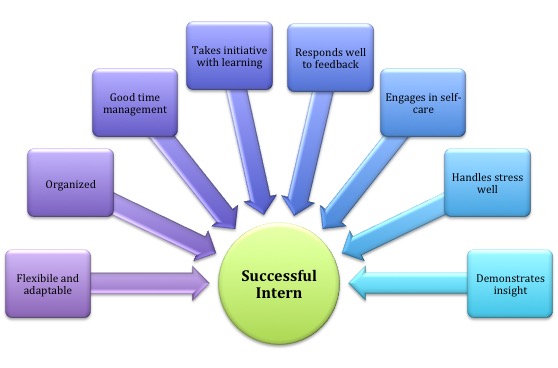Dietetics:Successful Internship
Defining Success
Success is defined differently by different people. What does success in internship mean to you? Before reading on, jot down a couple thoughts on what a successful internship would look like to you.
Below are some examples of success outline by past interns:
- "If in the time I had I was able to complete my assignments, ask a ton of questions, learn something new, and improve on some of my existing skills, then I feel like it was a successful placement"
- "My weekly improvements are noted by preceptors and I'm able to take over most of the caseload by the end of a rotation"
- "Feeling confident enough to be able to answer questions posed by preceptor related to a client or other theoretical questions"
- "I’m not going to become an expert in two weeks but if I’m consistently improving and learning new things, then I am happy."
Preceptors also have ideas about traits or behaviours demonstrated by successful interns:

Read on for tips and strategies that will help you on your internship journey! |
Work/Life Balance
Internship is a busy time. Feeling overwhelmed and stressed out is common! Avoid early burnout by taking time for yourself, and engaging in self care.
Tips and Tricks
- Schedule "you time" - You know you'll be stressed - so plan for it. Routinely plan and engage in personal activities that make you feel good and boosts self confidence. Examples include exercise, visiting friends or family, cooking a nice meal, baking, watching a movie, or any other hobby.
- Take mental breaks - Don't study all the time! You are much more likely to burnout early if you spend all of your time studying and engaged in internship tasks. Furthermore, you actually become less effective in your learning if your brain doesn't take a break.
- Prioritize your learning - Internship is a learning process... so prioritize your knowledge gains. Some strategies are to study for your upcoming rotation the weekend(s) before and just stick to the key points. Be in contact with your preceptor who can tell you which areas to focus on. Ask interns at different sites for useful resources.
- Stay organized - Keep track of important dates by using a journal or agenda, Make use of the Google Internship calendar. Staying organizing will help you manage your time.
- Know your limits - Be realistic about how much you can handle. If you'll be working during internship, see if it's possible to cut down your hours. Hold a job that you are comfortable with and avoid starting a new job that may be stressful.

Being a Professional Student
While you will still be a student during internship, you are also preparing yourself for a career. Behaviours and habits will have to change accordingly.
Professional Learning
Your learning will take place in a different environment than your university courses. As you will be taking on the roll of both student and professional, it is important that you adopt professional habits
Behaviours of a Learning Professional
- Be Confident - in your knowledge and ability to problem solve
- Ask - Asking for help when you need it (not after)
- Stay Organized – of your knowledge, schedules, and deadlines
- Have Integrity – your actions and behaviours are how you represent yourself, and will most certainly affect your future career
- Be Proactive – learning in a professional environment means you need to be proactive in what you want/need to learn
- Form Working Relationships – by communicating with other healthcare team members, they will see you as an important member of the team and approach you for your expertise
Behaviours of a Proactive Learner
- Take Initiative – if you don’t know something, look it up or ask! Don’t wait for someone to give you the answer
- Manage Your Knowledge - You are responsible for keeping your knowledge organized. Stay on top of material by making cheat sheets, binders, etc. (See more on Managing Knowledge below)
- Timely Learning – Put recently learned information immediately into practice
- Actively Seek Feedback – Feedback is a great way to learn what went well and what can go better (See more on Feedback below)
Setting Expectations
An important part of communication during internship is setting expectations. It is important to establish what expectations are with both internship coordinators as well as with new preceptors at the start of each rotation. Ask for clarification at any point if you aren't sure what is expected of you.
It is also important to be familiar with the evaluation forms for each module to ensure that you know what you are expected to learn and develop over each rotation. In case a preceptor does not cover something in your rotation that you know you are required to cover during the module, you can bring this up with them. It is important to own your education, and knowing what is expected of you throughout internship is key to succeeding. Check out this Podcast for real life internship scenarios and corresponding strategies for success!
Managing Knowledge
Knowledge Expectations
Interns are expected to have a certain level of foundational knowledge before beginning internship. The Integrated Competencies for Dietetic Education and Practice (ICDEP) outlines this foundational knowledge. Interns achieve these competencies throughout internship and in required program courses prior to internship. The UBC Program Competency Coverage Chart indicates in which modules or professional practice courses each competency should be covered.
Preparation
There are varied opinions about whether some studying over the summer would be beneficial. Interns should consider their own situations and areas of their knowledge they feel should be strengthened prior to internship. It may be useful to review the Required Skills for Dietetics document.
It should be noted that site specific resources are provided, so interns shouldn't feel anxious about knowledge gaps particular to their placement prior to internship.
Preparing Learning Resources for Internship
Prepare a toolbox of resources that can be referred to on a ‘just-in-time’ basis. This will be used throughout the internship when there are gaps in knowledge or skills. Keep in mind that this toolbox will be added to, and filled in with resources from preceptors and hospital databases as you go through internship. Therefore, do not spend too much time curating it beforehand.
Identifying Knowledge Gaps
Suggestions from previous interns and preceptors:
- "Take responsibility for your learning. You can do this in many ways such as reflecting often on your learning needs and goals throughout each module, collaborating with your preceptor on how you can achieve these and make adjustments. If possible, reach out to your internship coordinators for advice on how to meet your learning needs, and to develop learning plans if needed. Address any performance gaps early!"
- "I would do research or additional readings if my preceptor had noticed any weakness in my knowledge base, or if there was anything that peaked my interest that day."
- "Make sure to review any checklists/tasks with your preceptor mid-week or mid-rotation, to make sure you accomplish all that you need to by the end of the week/rotation."
References
1 University of Western Ontario. Preceptor Education Program Module. Retrieved from (using preceptor's login): https://owl.uwo.ca/portal/site/edc3ab16-818e-4173-88f4-e24cad89cf4b/page/ca8b7528-1826-4641-a2e2-57f8b7139a2d
